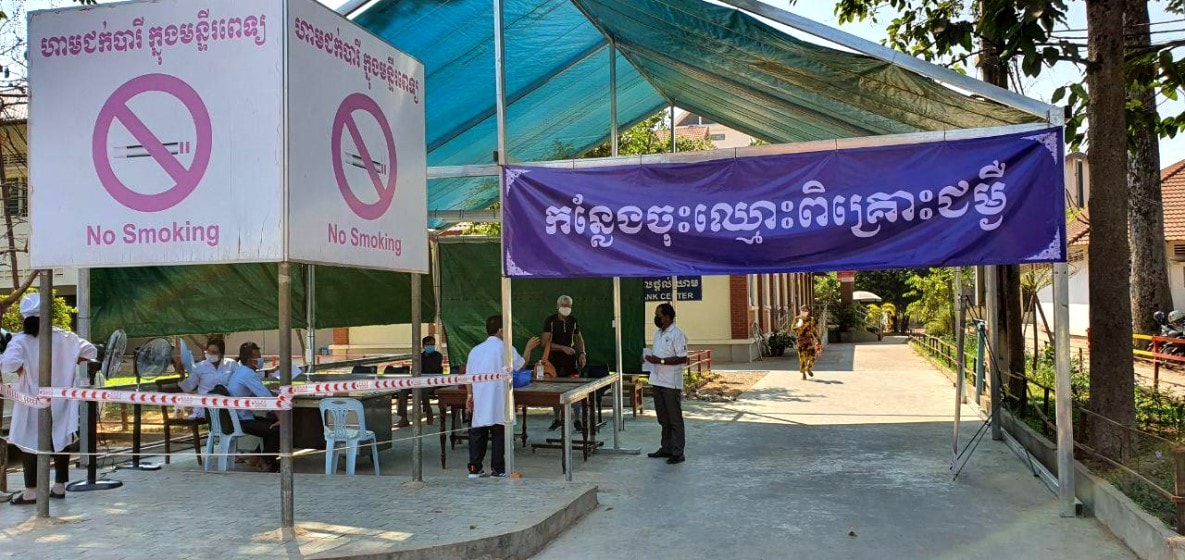CDC in Cambodia

A triage system was set up at Siem Reap Provincial Hospital in March 2020 after identifying a case-contact who tested positive for COVID-19.
The Centers for Disease Control and Prevention (CDC) established an office in the Kingdom of Cambodia in 2002. CDC works with the country’s Ministry of Health (MOH) and local and international partners to address HIV/AIDS, malaria, influenza, COVID-19, and other respiratory illnesses and infectious diseases. CDC’s partnership with the MOH strengthens Cambodia’s laboratory, surveillance, and workforce capacities to prevent, detect, and rapidly respond to disease outbreaks and other public health threats.
Global Health Security
Resilient public health systems can rapidly prevent, detect, and respond to infectious disease threats before they become epidemics. CDC’s team in Cambodia works to enhance the country’s ability to respond to public health emergencies and strengthen workforce capacity. CDC also played a key role in the MOH’s response to the COVID-19 pandemic.
CDC Cambodia provided guidance and training to public health responders working on the COVID-19 response.
CDC Cambodia supported the MOH’s Emergency Operations Center.
Through December 2023, the Field Epidemiology Training Program (FETP) has graduated 225 frontline trainees, among whom 10 have completed the intermediate course. These epidemiologists detect, prevent, and control diseases before they become epidemics.
CDC Cambodia supports the Cambodian Applied Veterinary Epidemiology Training (CAVET) program. CAVET’s 75 graduates respond to zoonotic disease outbreaks.
HIV/AIDS and TB
CDC works with the MOH to build a sustainable HIV response program. Cambodia strives to sustain epidemic control and eliminate HIV as a public health threat. CDC focuses on:
- Finding people with undiagnosed HIV and placing them on treatment
- Ensuring treatment continuity and client-centered services for all, including children and adolescents
- Developing an HIV case-based surveillance system for monitoring treatment and viral load suppression, and for using real-time data from HIV recency testing to find and respond to outbreaks
- Improving laboratory systems to detect and monitor HIV viral load
- Adopting and ensuring nationwide implementation of international HIV policies
- Supporting the national HIV and TB control programs to ensure that people living with HIV are screened for TB and receive TB preventive treatment
Through the U.S. President’s Emergency Plan for AIDS Relief (PEPFAR), CDC is working with Cambodia to end HIV as a public health threat by 2025.
CDC works with Cambodia’s national HIV and TB control programs to screen for TB among people living with HIV and provide TB preventive treatment.
Laboratory Capacity Building
CDC helps strengthen the quality of laboratory systems in Cambodia to accurately diagnose, monitor, and treat infections, including HIV, SARS-CoV-2, influenza, and other respiratory pathogens. CDC also helped implement a laboratory quality management system and is supporting provincial HIV laboratories to achieve international accreditation.

Staff from the Battambang Hospital referral laboratory collect COVID-19 samples in Battambang, Cambodia. Photo by Chiek Sivhdur/Battambang Referral Hospital
CDC Cambodia helped implement a laboratory quality management system (LQMS) and an external quality assurance program.
With technical support from CDC, the Cambodian National Public Health Laboratory (NPHL) received International Organization for Standardization (ISO) 15189 Plus™ accreditation in 2019 and was re- certified in 2023.
Malaria
Through the U.S. President’s Malaria Initiative (PMI), CDC and USAID support Cambodia’s National Center for Parasitology, Entomology and Malaria to pilot and expand malaria elimination activities in Western Cambodia. PMI supports the National Malaria Elimination Action Framework to scale up control and elimination activities for a malaria-free Cambodia by 2025. CDC and partners provide:
- Technical support for surveillance (antimalarial drug resistance and insecticide resistance)
- Case management
- Supply chain management
- Vector monitoring
- Social and behavior change communication
CDC malaria work in Cambodia, as part of the U.S. President’s Malaria Initiative with USAID, includes surveillance, vector monitoring, case management, and social and behavior change communication.
Influenza
CDC works with the Cambodian government and other partners to conduct influenza sentinel surveillance and build laboratory and response capacity. The network monitors seasonal influenza and detects novel influenza viruses among persons with respiratory disease. The platform has been expanded to test for SARS-CoV-2 and respiratory syncytial virus (RSV). Cambodia contributes to the World Health Organization (WHO) Global Influenza Network and global genomic surveillance of SARS-CoV-2.
CDC supports identification and characterization of circulating novel influenza viruses in Cambodia.
- 3 U.S. Assignees
- 23 Locally Employed
- Population: >16.8 million
- Per capita income: $4,430
- Life expectancy: F 73 / M 67 years
- Infant mortality rate: 12/1,000 live births
Sources: Sources: Population Reference Bureau 2022, Cambodia
- Stroke
- Lower respiratory infections
- Ischemic heart disease
- Cirrhosis and other chronic liver diseases
- Tuberculosis
- Neonatal disorders
- Diabetes
- Chronic obstructive pulmonary disease (COPD)
- Tracheal, bronchus, and lung cancer
- Road injuries
Source: GBD Compare 2019, Cambodia